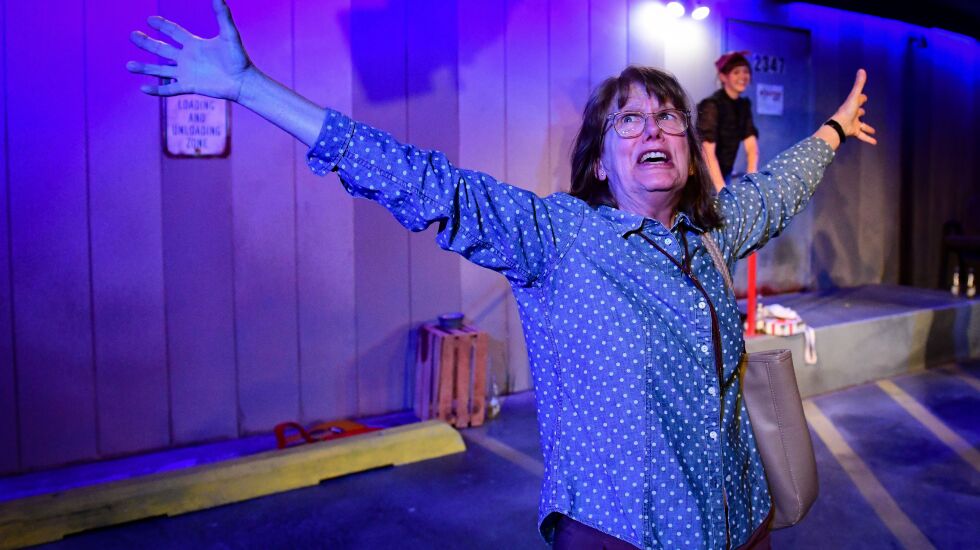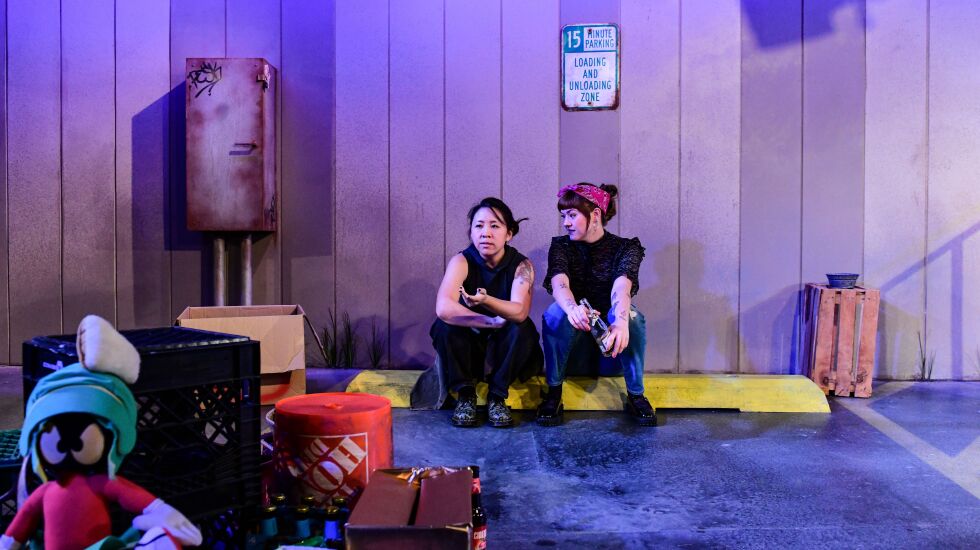
There’s nothing quite like a birthday to bring out the existential anxieties lurking within. So it goes for the three flawed, funny, utterly recognizable women in Brett Neveu’s latest drama, “Revolution,” which opened in a world premiere production Saturday at Old Town’s A Red Orchid Theatre.
For newly promoted salon manager Puff (Stephanie Shum), turning 26 means a spike in free-floating anxiety while a wealth of festering worry erupts to the surface. What if she’s made irrevocably wrong life choices? What if she’s getting old without truly living her life? Plans for a birthday celebration fill Puff with ambivalence and dread, despite best friend Jame’s (Taylor Blim) suggestion they celebrate by ordering ridiculous drinks at the nearby Rainforest Cafe.
Director Travis A. Knight shows a keen ear for angst and absurdity throughout. He’s matched well with Neveu’s style of black-hole-dark, comedy-meets-sentimental slice of life as it unfolds in an alley between a Ross Dress for Less store and a hair cuttery called Revolution.
The wild card in the 90-minute production is Natalie West’s Georgia, who shows up as Jame and Puff are making plans. Georgia has a few decades on the twentysomethings, and as such, more than a few trenchant, acerbic contributions to any conversation about irrelevance, regret and aging.
But “Revolution” feels incomplete, more like a series of wonderfully crafted, powerfully executed scenes than a fully realized drama. The ending, while briefly celebratory, is ultimately abrupt and unsatisfying.

Still, the three-person cast delivers a decidedly entertaining, occasionally profound rumination on aging, friendship and birthday-induced crises centered on regretting the past while fearing the future.
The story begins with Puff, her low-key anxiety quickly escalating on her birthday, her recent promotion to manager triggering not joy but a complex emotional skein of regret and apprehension. Jame, a stylist at the salon, insists they should celebrate, even if it’s just drinking beer and eating Mike and Ikes in the alley.
The party — and the play — really starts sparking when Ross employee Georgia wanders into the alley deeply in need of friends, or at least someone to share the platter of hors d’oeuvres she’s been driving around with. Throughout, West’s delivery defines the crux of a production where rib-rattling laughter exists at the edge of an abyss of despondence.
From her entrance, it’s clear Georgia’s been fed-up and kept down over the years, enough to make her capable of rebellion in the form of violent, destructive decisions. Neveu makes these qualities explicit in a climactic scene that moves from pulse-raising (kudos to armorer Max Fabian for making the danger look all too real) to heart-breaking to heartwarming within a moment. Georgia insists she feels like “a corpse stuck in white water rapids,” but West makes the character’s volatility clear with every word.
Blim and Shum are marvelous and completely endearing as friends who lift each other up. Blim’s Jame has a sparkle of mischievousness that matches her generosity. Jame knows exactly when to push and when to back off, the best friend every life needs. She also embodies the sort of person who can turn any situation into a party. Through sheer force of personality, Jame transforms the spare, inhospitable alley into a place of celebration.
Shum delivers Puff’s tightly wound dread with jumpy unease and tearful despondence. There’s a hair too much overt brow-furrowing, but Puff’s spiraling worries are easy to relate to. When Puff finally lets herself embrace the party mood, it’s a jubilant moment.
“Revolution” ably deploys the double-edged blade of laughter and sorrow to talk about the universal anxieties of aging, and to tell the story of a rock-solid friendship among a trio of women deeply worried that as their lives “unfold and unfold,” they’re stuck in the creases.
Whether the women are actually stuck — the word “should” comes up a lot — is a subjective call. What’s not in doubt is their total acceptance of each other and their ability to cultivate deep friendships in the face of overwhelming fear.
Neveu avoids both tropes and triteness in exploring issues usually laden with them in drama. Throughout, “Revolution” is a piece about love and joy soaked in acidic truths and wrapped in razor-wire plot twists.
Now, Neveu just needs to finish it.







